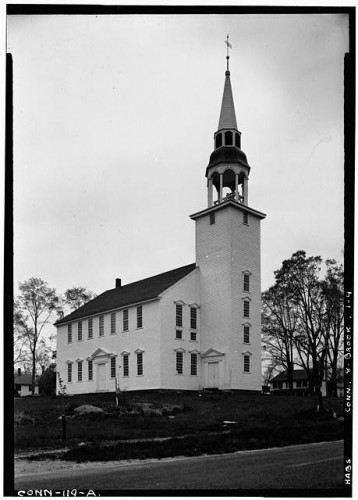In 1871, Celia Burleigh, a life-long activist and reformer, became minister of the Unitarian congregation in Brooklyn, Connecticut. This made her the first woman ever ordained in Connecticut and the first woman ordained in the Unitarian church.
Burleigh was born in Cazenovia, New York, in 1826, but there is relatively little information available about her childhood. After the failure of an early marriage, she lived in Syracuse where she taught, gave lectures on temperance and suffrage, and wrote articles for the Christian Register. On September 7, 1865, she married William Henry Burleigh, a reformer and publisher who, at the time, worked as a harbor master in New York City.
With the support of her new husband, Celia Burleigh made a name for herself as a national leader in support of women’s suffrage and the rights of children. In 1869 she helped organize the New-York-based Social Science Club, later renamed the Brooklyn Woman’s Club, and became its first president. Burleigh also worked diligently to create the first women’s business union. During this time, she frequently attended women’s suffrage conventions, like the North-western Woman’s Suffrage Association meeting in November of 1870. There, she took the platform alongside reformers such as Lillie Peckham and Susan B. Anthony.
A New Calling
In July of 1871, Celia received an invitation to become a summer minister in Brooklyn, Connecticut. Her husband William, who had died just four months earlier, had always encouraged Celia to be a minister, and although she had never preached before, she embraced the opportunity to have a weekly platform for delivering her message.
After finding a great deal of success preaching in Brooklyn in August of 1871, Burleigh accepted the church’s invitation to stay and become their permanent minister. On October 5, 1871, she was ordained as a minister in the Unitarian Church. Her ordination was such a momentous occasion that Julia Ward Howe (author of “Battle Hymn of the Republic”), read a letter of support for Burleigh written by Henry Ward Beecher, arguably the most well-known minister in the country.
Burleigh’s time as a minister in Brooklyn was brief but eventful. She kept a busy schedule preaching, furthering the cause of women’s suffrage, and even took part in the ordination of Mary Hannah Graves, the second woman to be ordained by the church. Unfortunately, after just two years as minister of the First Ecclesiastical Society of Brooklyn, Burleigh had to resign when she developed breast cancer.
In hopes of reviving her health, Burleigh moved to Danville, New York, where the hospital worked to improve her condition with a water cure. She served the congregation in Danville during her 18 months there but then returned to Syracuse when the effects of her illness required additional care. Celia Burleigh died in Syracuse on July, 25, 1875, and her remains were sent back to Brooklyn for burial.









